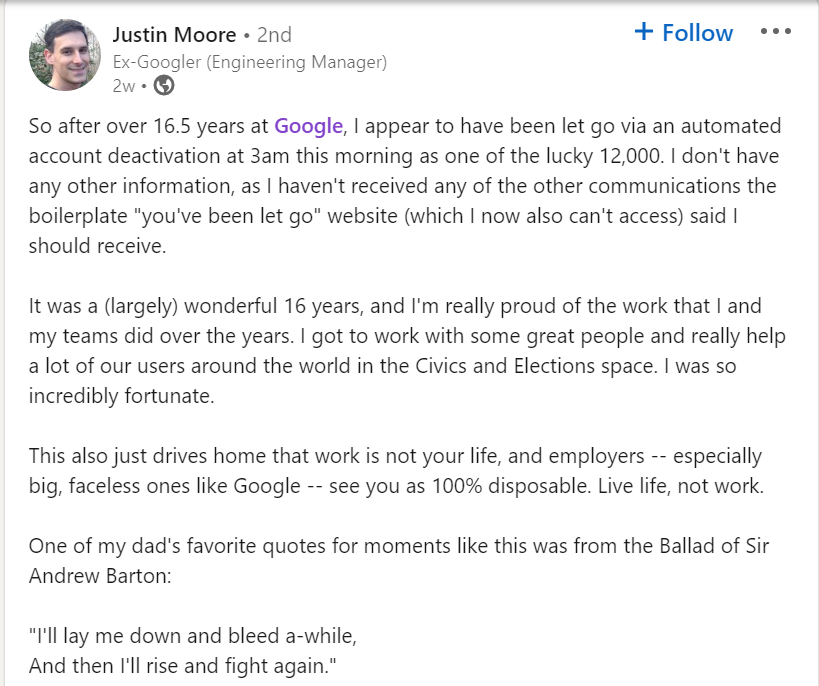Let's talk about layoffs: Where organizations are failing their employees
- 5 Min Read
The world is very different as an employer in 2023. The internet opened the door to your company, and it will never shut again. People are no longer concerned about the blowback from sharing their thoughts online. Sure, there are still anonymous reviews on sites like Glassdoor and Kununu. There are unhappy posts in Antiwork […]
- Author: Katrina Collier
- Date published: Feb 9, 2023
- Categories

The world is very different as an employer in 2023. The internet opened the door to your company, and it will never shut again. People are no longer concerned about the blowback from sharing their thoughts online. Sure, there are still anonymous reviews on sites like Glassdoor and Kununu. There are unhappy posts in Antiwork or Recruiting Hell on Reddit. But it seems now that more people feel confident writing about their latest experience with a company, including layoffs, even on sites that are visible to future employers.

For example, recently people have swiftly taken to LinkedIn to share the news of their layoffs. Take ex-Google Engineering Manager, Justin Moore. He shared his experience:
“So after over 16.5 years at Google, I appear to have been let go via an automated account deactivation at 3am this morning as one of the lucky 12,000. I don’t have any other information, as I haven’t received any of the other communications than the boilerplate “you’ve been let go” website (which I now also can’t access) said I should receive.”
He went on to add, “This also just drives home that work is not your life, and employers — especially big, faceless ones like Google — see you as 100% disposable. Live life, not work.”
How does that make you feel?
Employees will be more vocal than ever
I feel angry, sad, confused, and frustrated. I wonder where HR was and how a company that has one of the most detailed and strenuous hiring processes in existence, which ensures they only hire trusted super-fans, can suddenly treat them like an criminal when their ‘role’ becomes redundant.
The tragic part is, unlike regular companies, treating its employees like a disposable commodity, even after a long tenure, will have little impact on Google’s employer brand. People are still queuing around the corner waiting for their chance to jump the countless hurdles required to work for this tech giant.
But people won’t do that for most companies. They probably won’t do that for your company. Because, despite the scaremongering in the press, people still have power. They have a choice, and they don’t have to choose your company, manager, or ‘opportunity’ as their next step. With the empowered confidence our workforce now has when sharing honest and transparent feedback online, there is no place for wretched employee experience to hide.
Do we need to make layoffs?
Of course, if one believes the media, we could think we were in the worst recession since the 1920s and that every company on the planet is laying off people. But even here in the UK, we are currently not in a recession. Companies are still hiring, and the UK employment rate remains largely unchanged.
So far this decade, we have witnessed many companies over-downsize in 2020, and frantically over-hire and/or incorrectly forecast in 2021-22. In 2023, many are restabilizing after going through the turbulence of the pandemic and making some mistakes. Worryingly, some companies are conducting ‘copycat layoffs’. These are counterintuitive because layoffs are costly on morale and productivity. They often cost more on severance packages, insurance, and even the rehiring of the laid-off employee as a contractor to complete the work.
We need more humanity in HR
Unfortunately, the reality is that many organizations will downsize, whether or not this is the right business decision. HR and business leaders have an ongoing duty to their employees throughout these difficult periods. Once again, organizations are failing, and we can rely on vocal ex-employees to share their troubling testimonies online. Take another example from Google. Melissa Lam was formerly one of Google’s recruiters, and shares her concerns for her old candidates:
“Like many others impacted by the Google lay-offs, I wasn’t given an opportunity to say my goodbyes and thank yous, so here it is: To my current candidates who are expecting updates or have calls with me this week, I hope you understand I am unable to contact you as I was locked out of all system access on Friday morning and I trust you are in very capable hands.”
Further down the post she adds, “To my candidates who have recently joined or will be joining or have relocated to another country, and are feeling your excitement has changed to uncertainty, please know you are in my thoughts.”
I am sure they are feeling more than uncertainty. Panicked over the future perhaps. Scared the job offer will be rescinded. When many people are only a paycheque or two away from homelessness, I am sure many are having sleepless nights.
Communication during layoffs is an HR imperative
When downsizing is the only option, how can we support employees and protect their employer brand?
The companies who are winning are those like Stripe, who during their layoffs were open, vulnerable, and supportive. To avoid a productivity dip and a drop in employee morale, get honest with your employees. Let current and future employees know how your company is doing; don’t rely on them to investigate it themselves. Check-in and see how your people really are. Also warn them about the algorithms on sites like LinkedIn so that they know if they keep reacting to negative posts, that’s all they will see.
Remember that how you treat people within the ‘walls’ of your company is evident on the internet. So above all, be kind. Sadly, the days of job security are long gone so never forget that in a heartbeat it could be you. How would you like your company to treat you?
________________
Katrina Collier is on a mission to fix talent acquisition and candidate experience; often exacerbated by hybrid working. She does this through design-thinking workshops with talent acquisition and company leaders, as Author of The Robot-Proof Recruiter, as a mentor and as global keynote speaker.









